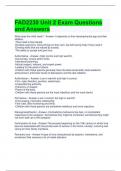Exam (elaborations)
FAD2230 Unit 2 Exam Questions and Answers
- Course
- Institution
FAD2230 Unit 2 Exam Questions and Answers What does the child need? - Answer--It depends on their developmental age and their abilities. -They need to feel valued. -Develop autonomy: Doing things on their own, but still having help if they need it. -Develop skills that are valued by society. -...
[Show more]



